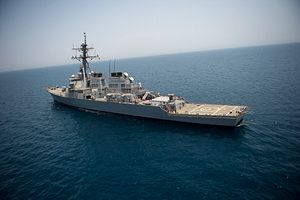Five Iranian boats fired shots across the bow of a Singapore-flagged tanker in the Persian Gulf on Thursday.
The captain of the Alpine Eternity, an oil products tanker, told Channel NewsAsia that five Iranian Revolutionary Guard Corps Navy ships approached the vessel and several shots were fired. The captain refused orders to stop the vessel and head to the Iranian port of Abu Musa, choosing instead to head to Dubai’s territorial waters. The captain said he was 15 miles off the Iranian coast at the time of the incident – three miles outside Iranian territorial waters.
According to CNN, while the ship did contact coalition warships in the vicinity to ask for help and a P-3 was sent overhead while the U.S. Navy began moving, the incident was over before it could get there. The UAE did send three of its coast guard boats out to the cargo vessel. Owner South Maritime later said in the statement that the ship had safely reached the port of Jebel Ali, and that there was no serious damage to the vessel and none of the crew members sustained any injuries.
Reuters cited a U.S. official speaking on condition of anonymity as saying that Iran had attempted to intercept the vessel in international waters because it is liable for damage to an Iranian-owned oil platform it hit on March 22. If true, that would be the second time the IRG has used commercial justifications to intervene in such situations within the past month following an incident where Iranian patrol ships seized and temporarily held a Marshall Islands-flagged container vessel in the Strait of Hormuz to settle a years-old debt case (The Diplomat reported on that incident here).
That in turn has negative implications for freedom of navigation for one of the world’s most important trade routes through which nearly a third of the world’s petroleum passes. The Pentagon, however, has thus far reportedly declined to say whether it will order U.S. warships to accompany commercial vessels passing through the Strait of Hormuz this time as it did after the previous incident.
The incident comes as US President Barack Obama and Gulf leaders are meeting in Camp David in a summit designed to reassure American partners that their security would not be affected by Washington’s ongoing efforts to broker a nuclear deal with Iran. The ongoing conflict in Yemen has also heightened regional tensions, pitting Iranian-backed Houthi rebels in Yemen against pro-government forces supported by a Saudi-led coalition.































